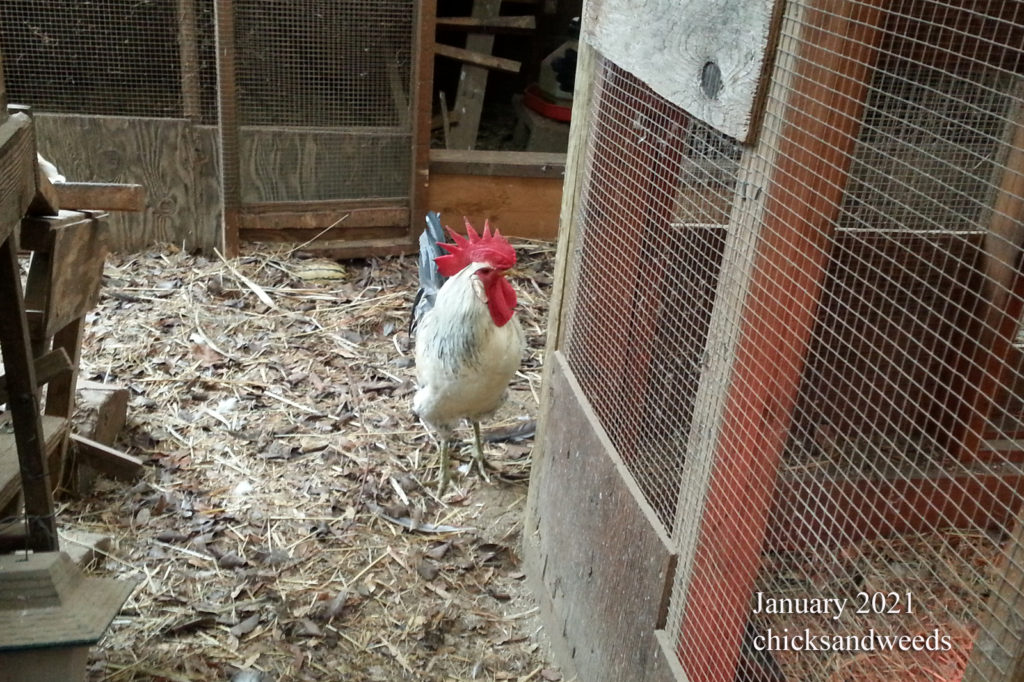Rooster management, part one
When a young cockerel starts challenging you
This guy is a cockerel hatched in my office in April 2020. Since I was the one who incubator-hatched him, he didn’t grow up with a mama amongst the flock. He noticeably never was a lap chick, always wanting to be independent. His only male hatch-mate, a couple of weeks younger than him, had it out as 3 and 5 week olds in some ferocity, then again at 3 months and even after that, once the hormones hit, this guy was quite insistent on chasing his buddy when in the coop, which I needed to handle by giving them more space during the daytime. Eventually, they arranged themselves.
But then, one day when he was around maybe 7 months, I felt a thud against the back of my leg. Well then, that was startling and …not acceptable.

So right there, when something like this happens, there are some things to be aware of and there are some things I do: step towards him, chase him, pick him up, offer food, not necessarily all at the same time.
Remind yourself that you are way bigger than him, you are smarter than him, he is only doing what his hormone driven behavior tells him and you own the space, and in this case, he does not even have spurs yet.
He is trying to establish dominance. If you walk away, he “thinks he won”. If you ever watched rooster fighting, there is the pre-fight behavior, the fight, and the post fight behaviour. The loser ends up walking or running away and from there on makes room for the dominant rooster, the one who won. So walking or running away is the thing not to do when he has already challenged you in your territory. You are the one who walks = you declared yourself the looser.
You turn around, make yourself big and step towards him. If he is really gutsy, he will take up the challenge, but you can chase him, pick him up and put him in a holding space if you don’t have the time, but do a little chase till he runs. I have had to do that a number of times till he got it. I have read that some people are quite severe in demonstrating who is the boss.
But I know he is still “thinking” about taking his chances sometimes, as you can see in this picture sequence.
It is his stance and the way he looks at me, though he didn’t go through the moves of pecking and scratching and giving me the wing. However, when he approaches as I offered food, he first went sideways (like they do during a challenge) before giving in to treat temptation. And this brings me to the other thing I do: offer food…hehe, this confuses them…because, that is not what establishing pecking order is about.
So this guy is young, he has no spurs, his hormones just come in plus mating season will start, and I might have to chase him again, and maybe even a little more vigorously and maybe pick him up. But the thing is, he needs to get it that he will never be the boss of me, and hopefully this will transfer to other humans, which don’t have any business walking into the coop and run without letting me know, and out in the field, there is enough space. And space is hugely important. There has gotta be enough of it, and then, don’t invade his (as a visitor). Roosters like this might go up against predators to protect their flock, so it is a balancing game
If you KNOW he respects you but other humans who enter “his” space will be challenged, then they need to either respect the space and don’t enter the zone, or need to establish pecking order, or, you can put him in a holding space till visitors have left.
For me, this is an experiment as he is the first of my roosters trying this. Why him and not the others: hormones/genetics and who knows what triggering event.
Do I want to breed this guy? I will evaluate that when he is a little older. Do I call him aggressive? No. He is not “aggressive” and that label isn’t helpful. He does seem to have more dominance behavior than my average roosters have had over the years, and time will tell how it evolves. It requires continued awareness. My hope is this: he will respect me and other humans and stay away from them, but be vigorous in protecting “his” flock from any other predators.
